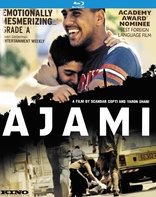Ajami Blu-ray Movie
HomeAjami Blu-ray Movie 
Kino Lorber | 2009 | 120 min | Not rated | Aug 24, 2010Movie rating
7.4 | / 10 |
Blu-ray rating
| Users | 4.5 | |
| Reviewer | 4.5 | |
| Overall | 4.5 |
Overview
Ajami (2009)
Thirteen-year-old Nasri and his older brother Oman face constant fear when their family becomes a target of assassination, after their uncle foolishly wounds a prominent clan member. The young Palestinian refugee Malek works illegally in Israel to finance his mother's life-saving surgery. An affluent Palestinian man dreams of building a life with his Jewish girlfriend. A Jewish cop is obsessed with finding his missing brother.
Starring: Fouad Habash, Shahir Kabaha, Ibrahim Frege, Scandar Copti, Hilal KaboubDirector: Scandar Copti, Yaron Shani
| Drama | Uncertain |
| Crime | Uncertain |
Specifications
Video
Video codec: MPEG-4 AVC
Video resolution: 1080p
Aspect ratio: 1.85:1
Original aspect ratio: 1.85:1
Audio
Hebrew: DTS-HD Master Audio 5.1
Subtitles
English
Discs
50GB Blu-ray Disc
Single disc (1 BD)
Playback
Region free
Review
Rating summary
| Movie | 4.5 | |
| Video | 4.0 | |
| Audio | 4.0 | |
| Extras | 2.5 | |
| Overall | 4.5 |
Ajami Blu-ray Movie Review
Israel, from the inside.
Reviewed by Casey Broadwater August 15, 2010Film scholar David Bordwell coined the term “network narratives” to refer to films where “several protagonists are given more or less the same weight as they participate in intertwining plot lines,” with an attempt to “show a larger pattern underlying their individual trajectories.” (Bordwell frequently mentions the trend in his excellent blog, which can be found here.) The network narrative is nothing new—one of the best examples is Robert Altman’s 1975 country music comedy Nashville—but within the past decade, the form has been increasingly used for Big Issue movies that try to parse socio- political problems through multi-threaded and frequently multi-cultural stories. I’m thinking specifically of Alejandro González Iñárritu’s tri-pronged, world-spanning Babel, Paul Haggis’ racially charged Crash, and Syriana, the geopolitical thriller by Stephen Gaghan. Ajami, the Academy Award-nominated film by co-directors Scandar Copti and Yaron Shani — the former a Palestinian Arab, the latter an Israeli Jew—is the latest “hypertext” movie to examine hot-button racial issues through the eyes of multiple characters. Unlike Crash, though, and more so than Babel, it’s genuine and gripping, a maelstrom of a film that spirals around a moment of misunderstood violence.
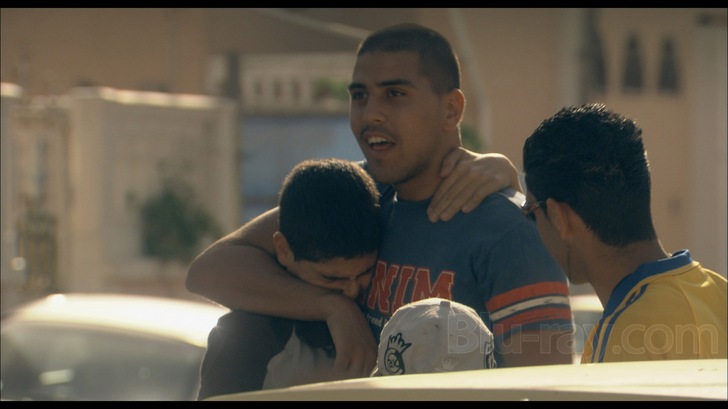
Omar and Nasri
Ajami, the setting of the film, is a multi-ethnic neighborhood in Jaffa, Israel, where Jews, Arab Christians, Palestinian Muslims, and clan-loyal Bedouins are crammed in close proximity. This is no melting pot, though, and the various cultures stay rigidly defined and codified, each wary of the others, making for a tense existence that seethes with racial hostility. The film opens with the murder of an innocent teen by Bedouin hit men, a clear case of mistaken identity. The intended target was Omar (Shahir Kabaha), a young Muslim whose uncle shot a Bedouin extortionist in self- defense. Fearing for the lives of his family, Omar asks for help from his employer, Abu Elias (Youssef Sahwani), a Christian restaurateur and respected businessman who brokers a peace settlement with the Bedouin tribal council. The only problem is that it’s going to cost Omar’s family $57,000. When he stumbles into the possession of a large quantity of crystal meth, Omar spots a chance to raise the cash, but his inexperience as a drug dealer leads to the film’s central event: an undercover drug bust gone bad.
But this is only one strand of Ajami’s tightly woven narrative tapestry. We also follow the plights of several other characters whose fates are also somehow tangled in the botched up drug bust. Malek (Ibrahim Frege) is a soft-spoken illegal Palestinian immigrant who works at Abu Elias’ restaurant and desperately needs money to pay for his sick mother’s surgery. Binj, played by co- director Scandar Copti, is a Muslim party boy who takes heat from his friends for dating a Jewish woman. Meanwhile, Dando (Eran Naim), an Israeli cop, searches for his missing brother, whose disappearance has left his extended family in a state of perpetual mourning. Throughout the film, Omar’s younger brother Nasri (Fouad Habash)—an intuitive young artist who seems to be able to sense when something bad is about to happen—sketches what he sees, turning his first-hand experiences into a graphic novel of sorts.
Not only is Ajami a network narrative, sticking these disparate characters into an interconnected web of cultural drama, but it’s also frequently non-linear, jumping back and forth through time, selectively revealing details in order to maximize the film’s emotional punch. Co- writers and directors Scandar Copti and Yaron Shani have crafted a script as precise as Swiss clockwork, but without the cold, mechanical lifelessness—or predictability. The filmmaking team plays with our expectations, overturning narrative assumptions and also slyly making the point that people shouldn’t judge others by their religion, appearance, or even necessarily their actions, without knowing the full story. And when Copti and Shani do reveal the full stories of their characters, the film offers some genuinely satisfying ah ha moments.
Ajami was shot, in the vein of neo-realism, with hand-held camerawork and a cast comprised entirely of non-professional actors who were culled from year-long improv workshops. It worked. The performances are raw and honest across the board, and you can practically feel the burning Middle Eastern sun on your back and taste the dust being kicked up from Ajami’s dirt- covered streets. The effect is a film, like Close-Up or F is for Fake, where the attempt is to blur the distinction between documentary and drama. In the film’s unflinching violence, you could also draw comparisons to City of God and Gomorrah, international crime dramas that explore the cultural dynamics of a specific locale.
Here, of course, it’s Israel, where the socio-political-religious situation is so complex that we tend to—and often have to—lump people into read-made, overly simplified groups. Ajami tries to break down these easy classifications by focusing on personal stories and the universality of human emotion. Taken individually, some of the plotlines are a bit typical— clichéd even—like Omar’s secretive, Romeo and Juliet-style relationship with Abu Elias’ daughter Hadir (Ranin Karim), which is doomed from the start because he’s a Muslim and she’s Christian. As a whole, however, the film is effective as both a collage of modern Israel’s diversity and a reminder that underneath our differences, we all feel the same love, anger, and heartbreak.
Ajami Blu-ray Movie, Video Quality 
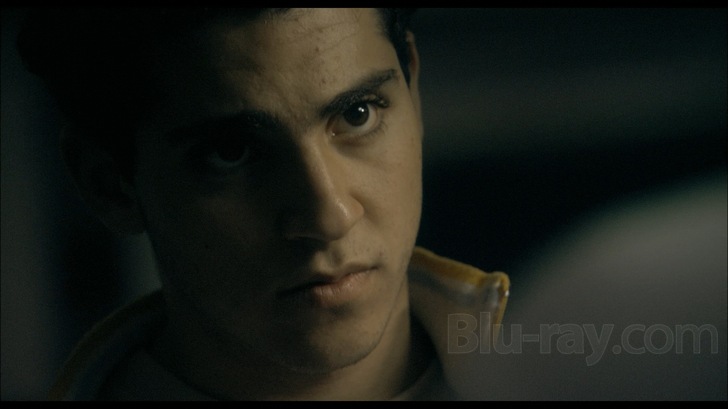
IMDB.com and various promotional materials all state that Ajami was shot on 35mm, but that doesn't appear to be the case. A bit of internet sleuthing, with some help from cinematography.com, reveals that the film was actually shot using Sony's 900R HD video camera. As far as I can tell, the original video material was printed on 35mm and then telecined back into digital form, that is, a 1080p/AVC-encoded transfer. And that's exactly what Ajami looks like here. Initially, this is somewhat confusing because the image looks very video-ish, but there's also noticeable film grain. I'm confident that the film has been given as a good a treatment as it could get considering the multi- media process, but there are a few quirks—mostly relating to the HD video source footage—that eagle- eyed videophiles will spot quickly. Most notably, the darker scenes are peppered with digital chroma noise, making black levels somewhat hazy/grey and giving the picture a decidedly gritty quality. Overall clarity is also mixed; there are some sharp close-ups—letting us make out small details, like the stubble on Omar's chin—but fine texture is often lost in the grit of the image. Like I said, though, this can all be attributed to the unique way the film was shot and processed. The film's color palette is nicely toned, though, with an amber cast that accentuates the Middle Eastern heat. Ajami most likely looks quite close to its intended appearance, which is why I'm giving it a solid 4/5, but if the noise, black level, and clarity issues were the result of transfer-related troubles and not the quality of the source material, I'd probably hand out a marginally lower score.
Ajami Blu-ray Movie, Audio Quality 
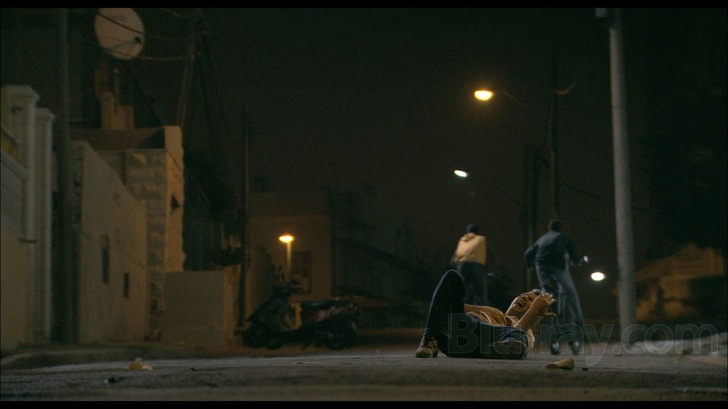
Despite the presence of guns, drugs, and cops, Ajami is not an action film and, consequently, doesn't have a whiz-bang-pow action movie soundtrack. Instead, Ajami's Hebrew/Arabic DTS-HD Master Audio 5.1 surround mix is a realistic, fairly low-key affair, with a moderate amount of rear channel output—mostly quiet city ambience, like traffic sounds, distant bird calls, and the bleating of livestock in the streets—and a score that complements, rather than overpowers, the emotions of the film. Most of the activity takes place up front, and there's a perfect balance between dialogue, music, and effects. Sudden violence gives the track a chance to stretch its muscles, as loud gunshots shatter the near silence, and the LFE channel is occasionally activated for bumping club music. The score, comprised of aching vocal ululations and indigenous instrumentation, sounds full and clean, and there are no drop-outs, hisses, hums, or buzzes. Optional English subtitles are available in easy-to-read white lettering.
Ajami Blu-ray Movie, Special Features and Extras 
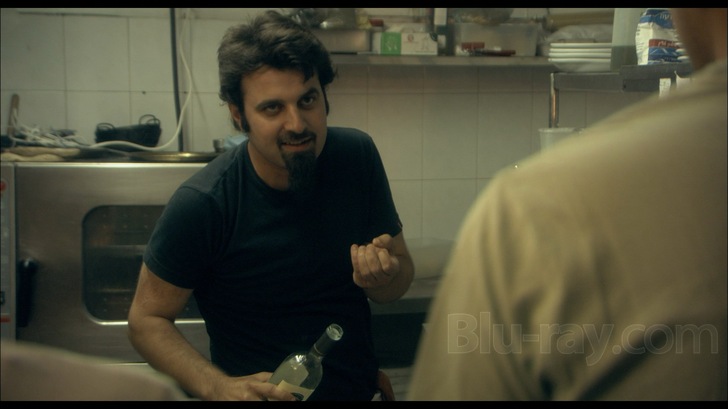
Ajami: The Story of the Actors (1080i, 29:18)
In lieu of a director's commentary or "making of" documentary, we get this excellent behind-the-
scenes look at the process of casting and rehearsing non-professional actors for roles in the film. Here,
we watch acting workshops and improv exercises, and get interviews with various cast and crew
members.
Deleted Scenes (1080i, 23:07)
The first thing that made me suspect that the film wasn't shot on 35mm—well, aside from actually
inspecting the image—was that fact that these ten deleted scenes were clearly shot on video. The
scenes themselves are mostly additional character beats—rightly cut from a film that's a bit too long
as it is—and while there's nothing that offers any new insights, they're certainly worth
watching.
Theatrical Trailer (1080p, 1:43)
Stills Gallery (1080p)
A user-directed gallery containing 24 production stills.
Ajami Blu-ray Movie, Overall Score and Recommendation 
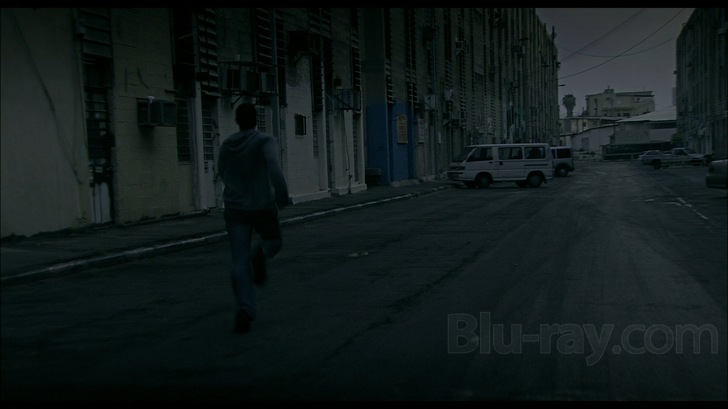
As a "network narrative" film—one that follows multiple story lines—Ajami is more genuine than the phony-baloney Crash and doesn't have to strain as hard as Babel to make a socio-political point. Using non-professional actors and hand-held camerawork, the film has the unflinching realism of a documentary, the heartrending resonance of a tightly crafted drama, and it fully earns its recent Academy Award nomination for Best Foreign Film. This is emotionally compelling, mentally stimulating world cinema. Highly recommended.
Similar titles
Similar titles you might also like

Revenge of the Green Dragons
2014

Toto the Hero
1991

In the Fade
Aus dem Nichts
2017

A Touch of Sin
天注定 / Tian zhu ding
2013

Pieta
피에타
2012

The Attack
2012

The Damned
La caduta degli dei
1969

Women Talking
2022

Hamlet
1948

Birds of Passage
Pájaros de verano
2018

A Fantastic Woman
Una mujer fantástica
2017

Loveless
Нелюбовь / Nelyubov
2017

Tchao pantin
So Long, Stooge | Limited Edition
1983

The Fool
Дурак / Durak
2014

Phoenix
2014

Like Someone in Love
ライク・サムワン・イン・ラブ / Raiku samuwan in rabu
2012

The Marriage of Maria Braun
Die Ehe der Maria Braun
1978

Sympathy for Mr. Vengeance
Ultimate Revenge Edition
2002

A Bittersweet Life
2005

Bullhead
Rundskop
2011
